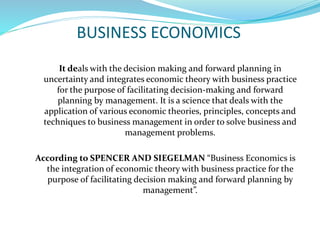Top Challenges Facing Business and Economics in the Post-Crisis Era
Top Challenges Facing Business and Economics in the Post-Crisis Era
Blog Article
Understanding Financial Concepts for Better Service Decision-Making
In the complicated landscape of contemporary company, a comprehensive understanding of economic concepts can substantially improve decision-making processes. By examining factors such as market frameworks and consumer behavior, companies can tailor their strategies to straighten with competitive characteristics and customer requirements. Moreover, understandings into demand flexibility and opportunity prices supply a framework for optimizing source allotment. The application of these economic concepts often exposes unexpected difficulties and opportunities that can redefine calculated approaches. What ramifications do these understandings hold for the future of service strategy?
The Fundamentals of Economic Concept
Financial concept functions as the foundation for comprehending just how organizations and individuals choose in the visibility of deficiency. At its core, economic theory analyzes the allowance of minimal sources to satisfy unlimited wants. This essential principle of shortage demands compromises, engaging decision-makers to evaluate the prices and advantages linked with various choices.
The 2 key branches of financial concept are microeconomics and macroeconomics. Microeconomics concentrates on individual agents, such as companies and consumers, examining their habits and interactions in certain markets. It highlights ideas like supply and demand, price elasticity, and market stability, which are essential for comprehending exactly how costs are figured out and exactly how resources are dispersed.
Alternatively, macroeconomics checks out the economic situation in its entirety, attending to wider problems such as inflation, joblessness, and financial growth. It provides understandings right into systemic sensations that affect all financial agents, directing policymakers in crafting effective financial techniques.
Ultimately, a strong grounding in economic theory is crucial for effective organization decision-making. By recognizing the principles of deficiency, compromises, and market dynamics, companies can better make and navigate intricate atmospheres educated options that enhance their affordable advantage.
Trick Economic Indicators
Secret financial signs function as necessary tools for assessing the health and wellness and direction of an economic situation, supplying important understandings for company decision-making. These indications are measurable steps that mirror the economic performance and can be classified into leading, delaying, and coincident indications.
Leading signs, such as customer confidence indexes and securities market patterns, forecast future economic activity, permitting businesses to expect adjustments on the market. Delaying indicators, like joblessness prices and corporate earnings, provide insights right into the economy's past efficiency, helping businesses to examine long-lasting fads. Coincident indicators, such as GDP development and retail sales, fluctuate concurrently with the economic situation, providing a real-time picture of financial problems.
Recognizing these indicators allows businesses to make educated decisions pertaining to financial investments, resource allocation, and tactical planning. For circumstances, a surge in customer self-confidence may trigger business to boost manufacturing in expectancy of greater need. On the other hand, increasing unemployment rates might lead to a reevaluation of expansion plans. By closely monitoring these key financial indications, organizations can browse uncertainties and position themselves successfully in the ever-changing financial landscape, eventually improving their why not check here decision-making processes and lasting success.

Market Structures and Characteristics
Recognizing market structures and characteristics is crucial for services intending to flourish in affordable settings. Market structures, extensively classified right into perfect competitors, monopolistic competition, oligopoly, and syndicate, significantly influence prices approaches, product differentiation, and affordable actions. Each framework provides one-of-a-kind difficulties and possibilities that can dictate a company's critical direction.
In ideal competitors, many tiny companies complete, leading to minimal prices power and homogeneous products. On the other hand, in monopolistic competitors, companies separate their items, permitting some degree of pricing power while still dealing with competitors. Oligopolies, identified by a couple of leading gamers, bring about synergistic decision-making; companies have to carefully consider competitors' reactions to their actions. Monopolies exist when a single firm regulates the market, resulting in optimal rates power however commonly drawing in regulative scrutiny.
Recognizing these characteristics allows businesses to expect market trends, adjust approaches, and enhance resource allotment. Furthermore, acknowledging exactly how exterior variables like innovation and policy influence these frameworks can boost tactical preparation. By mastering market frameworks and dynamics, firms can make educated choices, eventually enhancing their competitive position and driving sustainable growth.
Consumer Behavior Insights
Consumer habits plays a crucial role in shaping organization approaches and results. Comprehending just how consumers make acquiring choices, their preferences, and the elements influencing their habits can dramatically enhance a company's capability to fulfill market needs. Secret read this article understandings into consumer actions can be stemmed from evaluating demographics, psychographics, and behavior patterns.
Demographic variables such as age, earnings, education, and gender level give a fundamental understanding of target markets. Psychographics dive deeper, exploring customers' perspectives, worths, and way of livings, which can affect brand name commitment and item understanding. Behavioral insights, such as buying regularity and response to promotions, are vital for tailoring why not try this out advertising initiatives.
In addition, outside variables like financial conditions, social trends, and technical developments additionally affect customer choices. For example, during economic declines, consumers may focus on necessary products over deluxe items, changing need patterns.
Using Business Economics to Strategy
Insights obtained from consumer behavior contribute in developing effective company approaches. By leveraging financial concepts, organizations can better recognize market characteristics, optimize source allowance, and improve affordable placing. Evaluating demand flexibility, for example, enables firms to change pricing methods to make the most of income while staying appealing to customers.
Furthermore, comprehending market segmentation enables services to customize their offerings, ensuring they meet the specific requirements and choices of varied customer groups. Business and Economics. This targeted technique boosts client contentment and fosters brand name commitment

Integrating video game concept right into strategic preparation also offers understandings right into affordable behavior, enabling companies to anticipate competing actions and devise counter-strategies efficiently.
:max_bytes(150000):strip_icc()/business-economics.asp-FINAL-625037bc97be4d2291ea40d6d291c9f5.png)
Final Thought
In final thought, a detailed understanding of financial concepts significantly enhances organization decision-making. By taking a look at market frameworks, evaluating customer actions, and analyzing vital financial indications, companies can create effective strategies that align with market needs.
In the complex landscape of contemporary business, a complete understanding of economic concepts can substantially enhance decision-making procedures.Leading indications, such as customer self-confidence indexes and stock market trends, forecast future economic activity, allowing organizations to prepare for modifications in the market. By carefully keeping an eye on these essential financial indications, businesses can browse unpredictabilities and place themselves effectively in the ever-changing financial landscape, ultimately improving their decision-making procedures and lasting success.
By leveraging financial principles, businesses can much better understand market dynamics, maximize resource allocation, and boost competitive positioning.In verdict, a comprehensive understanding of economic concepts dramatically enhances business decision-making.
Report this page